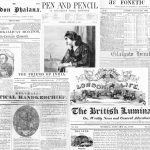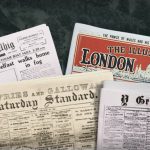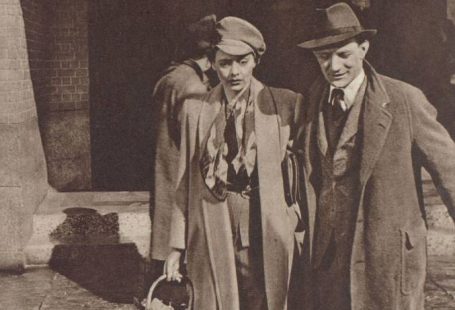This week at The Archive we have added an amazing 322,444 brand new pages, with eight brand new titles joining us in all, from Scotland, England and the Caribbean. Meanwhile, we’ve made one million more newspapers free to view as part of our collection, which you can find out more about here.
We’ve also made extensive updates to 23 our existing titles, so read on to find out more about all of our new and updated titles of the week, as well as to discover more about the ‘Colour Ban’ in Britain in the 1920s and 1930s, which saw Black performer Paul Robeson barred from a restaurant in London.
Register now and explore the Archive
We begin today’s journey in the Caribbean by welcoming the Dominica Tribune to our collection of international titles, which was founded in Roseau, the Dominican capital, in 1924. A thorough and fascinating newspaper, the Dominica Tribune appeared every Saturday at the price of one pence, and was published by J. R. Ralph Casimir (1898-1996), a Dominican poet, editor and bookseller.

Indeed, Casimir, who was born into a lower-middle class Black family in Dominica, was a pioneering political activist, who was a firm proponent of pan-Africanism. His ideals informed the politics of the Dominica Tribune, and he would go on to become a founding member of Jamaican political activist Marcus Garvey’s Universal Negro Improvement Association (UNIA), organising the Dominica branch. Meanwhile, Casimir acted as secretary at the 1932 Dominica Conference, a forerunner of the West Indies Federation, which advocated for the democratisation of the Caribbean English-speaking colonies in the first steps towards self-government.
Casimir’s activities went beyond politics too; as a publisher he compiled the first Dominican poetry anthology, whilst as a writer he had his work published in a variety of Black periodicals, such as W. E. B. Du Bois’ The Crisis, as well as in the Pittsburgh Courier.
So what sort of content did his newspaper the Dominica Tribune contain? A lengthy title, filling eighteen pages, the publication contained news from across the island of Dominica, with a look at the ‘Roseau Town Notice Board,’ the state of the roads on the island, and news from the circuit court. The Dominica Tribune, meanwhile, had a particular focus on cricket, with cricket notices, cricket fixture lists and cricket notes all to be found within the pages of the newspaper.

The Dominica Tribune looked beyond island life, furthermore, chronicling the latest news from across the Caribbean and beyond, as well as publishing a weekly feature on health issues, authored by J.R. Williams. It also contained articles devoted to Black interests across the world, such as one authored by Thurston Macauley, an International News Service journalist, entitled ‘London Is Aroused By Color-Ban Issue,’ which you can find out more about later on in this blog, and one addressing the possibility of a patios newspaper, from a correspondent in Marigot, Saint Martin.
Through the 1940s the Dominica Tribune was one of two newspapers to be published in Dominica, alongside the Dominica Chronicle, the former title having incorporated the Dominica Guardian. All three newspapers can be accessed on the British Newspaper Archive.
We return back across the Atlantic now to welcome our next new title of the week, which is the Richmond Herald. Established in Richmond, Surrey, in 1885, this Conservative newspaper first appeared on the 4 July 1885 at the cost of one penny, with the full title of the Richmond Herald and Mortlake, Kew and Petersham Standard, and North Surrey Chronicle.

With the Shakespearean motto derived from Henry VIII of ‘I wish no other Herald/No other speaker of my living actions/To keep mine honour from corruption/But such an honest chronicler,’ the new newspaper introduced itself as follows:
We think the time has come for Richmond to have a newspaper devoted solely to its welfare, and it will be our chief aim to provide one in which there will be no divided interests, and in which the majority of the inhabitants may rely upon getting that direct representation of their opinions they have so long wanted. Full and impartial reports of local events will be an important feature. While meetings of the Vestry and Board of Guardians will be fully reported, other interesting events – such as those connected with the various religious bodies and our local institutions – which, up to the present have been only imperfectly recorded or even ignored, will be fairly dealt with.
Promising also to offer ‘due attention’ to the adjacent ‘parishes of Mortlake, Kew and Petersham,’ the Richmond Herald also summarised its robust political beliefs:
In putting facts plainly before our readers from time to time, in a spirit of moderation, we trust to be able to show the fallacy of the Liberal cry of ‘Peace, Retrenchment and Reform,’ and to prove beyond doubt that the true friends of this country are those who adhere to Conservative principles.
Indeed, the Richmond Herald was true to its aims in being a thorough local paper. Across its eight pages you can find ‘Local News,’ such as reports on ‘fatal accidents’ in Richmond, as well as news from the Richmond Petty Sessions, the Richmond Board of Guardians, the Richmond Vestry Meeting, the Mortlake Rural Sanitary Authority, the Twickenham Flower Show, and ‘Useful Information,’ which incorporated items like details on local post offices, places of worship, and railway timetables.

Meanwhile, the Richmond Herald also featured more special interest features, with a look at ‘Art and Literature’ and ‘Field and Dairy Farming,’ and true to its politics, it also published commentary on ‘Conservative Policy.’ The newspaper, furthermore, printed serialised fiction, with stories like My Wife Or His, authored by Clementine Montagu, and a look at national and international news.
From 1889 onwards, the newspaper became known as the Richmond, Twickenham & Barnes Herald, circulating in ‘Richmond and the Kingston Parliamentary Division.’
Our next new title of the week also hails from the west of London, and it is the Staines Leader. This newspaper was founded in 1983 as simply The Leader, replacing The Star, which had been established some two years earlier. In 1988 the title became known as the Staines & District Leader, switching between various titles to become finally the Staines Leader in 2002.

A weekly freesheet tabloid, the Staines Leader appeared every Thursday, covering the north Surrey market town of Staines, which historically was a part of Middlesex. It also contained the news from the south-western fringes of Greater London, incorporating Virginia Water, Egham, Wraysbury, Feltham, Sunbury and Shepperton, before ceasing publication in October 2008.
From the Leader to the Informer now, and we’re delighted to welcome the Ruislip & Northwood Informer to The Archive. Appearing every Friday, this weekly freesheet was ‘part of the award winning Informer series of newspapers,’ covering various communities in the London Borough of Hillingdon, including Ruislip, Ruislip Gardens, Ruislip Manor, South Ruislip, Northwood, Eastcote and Ickenham.

Remaining in the south of England, our next new newspaper of the week hails from Kent, although it covered the news from across the county border in East Sussex. This newspaper is the Uckfield Courier, which was sold in the East Sussex market town of Uckfield and its surrounding villages. Appearing every Friday, the Uckfield Courier was launched in 1988 as part of the Kent & Sussex Courier family of newspapers, which was based in Tunbridge Wells.
One of eight sister newspapers, the Uckfield Courier was easily the smallest of the eight editions, selling fewer than a thousand copies by 2007.

From Uckfield to Ely now, and we’re happy to introduce Cambridgeshire newspaper the Ely Town Crier to our collection. Launched in 1973, and appearing every Saturday, the Ely Town Crier covered the counties of Cambridgeshire and Huntingdonshire, as well as parts of Western Suffolk and the Isle of Ely. It also claimed to featured ‘the most talked about columnists in the county,’ becoming the Ely Weekly News & Town Crier in 1997.
In 2000 the newspaper changed its name again, becoming the Ely Weekly News, before ceasing publication on 1 October 2017.

Our penultimate new title of the week hails from Lancashire, and is the Skelmersdale Advertiser, which was founded in 1966 as the Skelmersdale New Town Advertiser. Although there was mention of the town of Skelmersdale in the Doomsday Book, most of the town was developed as a second wave new town in the 1960s, hence the title of this newspaper.
A sub-edition of the Ormskirk Advertiser, both newspapers having their editorial offices in Southport, alongside the Southport Visiter, the Skelmersdale Advertiser dropped the ‘New Town’ part of its title in 1986.

Our final new title of the week is a Scottish one, and is the Airdrie & Coatbridge World, which was published in the North Lanarkshire town of Airdrie from 1982. Covering the area known as Monklands, which consists of Airdrie and nearby Coatbridge, which lie to the east of Glasgow, this newspaper was a weekly tabloid freesheet, appearing every Friday.
Claiming to be ‘Scotland’s Best Free Newspaper,’ the Airdrie & Coatbridge World was distributed to just under 30,000 homes, before it ceased publication in 2011.

That’s it from our new titles of the week, but we have updated a bumper crop of our existing titles too over the past seven days. Highlights include the over 40,000 new pages that we have added to the West Briton and Cornwall Advertiser, whilst we have added over 18,000 new pages to the Leicester Daily Mercury, and over 15,000 pages to the Torbay Express and South Devon Echo.
‘Colour-Ban Issue’ In London – November 1929
On 11 January 1930 our new title the Dominica Tribune printed an article regarding the ‘Color-Ban Issue‘ in London, which saw Black people barred from areas of everyday life, like visiting certain restaurants. Elsewhere, Black athletes were subject to the ‘Colour Ban’ in the world of sport, for example, they were banned from participating in boxing.
The article, penned by International News Service journalist Thurston Macauley for the New York Times, relates how African-American singer and actor Paul Robeson was barred from entering a London restaurant. Please do be aware that the article uses outmoded language with regards to ethnicity, such that we would not use today.
London, Nov. 14 – London has been stirred up over the question of the color ban, which was brought to the fore recently when admittance to a London grill room was refused to Paul Robeson, American Negro singer and actor, and his wife.

Macauley notes how Robeson had ‘achieved great popularity’ in Britain thanks to his appearances on stage, including his turn in Show Boat, but also relates how this was not, sadly, an isolated incident. Wealthy Black Chicago newspaper proprietor Robert S. Abbott had been barred ‘from the twenty London hotels,’ causing protests from London’s Black community.

London’s Black community met in ‘mass’ protest, with ‘white sympathisers’ also in attendance, including James Marley, Labour M.P. for Saint Pancras North. Marley had conducted a ‘personal investigation of the matter,’ and had obtained the below statement from then Prime Minster Ramsay MacDonald, regarding the barring of Robert S. Abbott from London hotels:
It is a most disturbing affair and not in accordance with our British hotel practice. No, department, however, is responsible for it, and I cannot think of any way wherein the government can intervene.
The racism at the heart of British society was endemic; James Marley revealing further instances of when Black patrons had been asked to leave various dance halls. Marley stated:
These men include a solicitor of the Supreme Court of Grenada, a post graduate of the London School of Tropical Medicine and a member of the Middle Temple. They look upon the incident as a serious affront and have written to Lord Passfield, Secretary for the Dominions.

Further to the barring of both Paul Robeson and Robert S. Abbott from various hotels and restaurants, journalist Thurston Macauley took it upon himself to canvass ‘principal places’ across the capital, the results being as follows:
The manager of the Grosvenor was unwilling to express an opinion.
The same was true of the manager of the Waldorf.
The manager of the Ritz replied: ‘If the Negro was a gentleman it would be unfair to refuse him. We have never done so.’
The manager of the Mayfair said: ‘As in the past, I shall rely solely on my own judgements.’
The director of the Park Lane said: ‘I think it not right for people to take exception to the presence of a colored man in a hotel restaurant. It would be bad manners. We have always entertained colored men.’
Meanwhile, it was reported that both Claridge’s and the Berkely would ‘not refuse’ admittance to Black patrons, but the results of the canvassing were hardly encouraging for the Black community.

Macauley ends his piece by noting how such attitudes in Britain were ‘astonishing to Europeans, who have always freely admitted colored people almost everywhere.’ And his piece is highly illuminating, demonstrating the challenges that Britain’s Black population and Black visitors to Britain faced in gaining equality and respect in British society, the article being especially poignant as it was printed in a newspaper published in the Caribbean.
For more on Britain’s Black population and their struggle for equality during the 1930s, you can browse the pages of The Keys, which is available for free on The Archive.
New Titles
Title |
Years Added |
| Airdrie & Coatbridge World | 1995 |
| Dominica Tribune | 1930-1951 |
| Ely Town Crier | 1993 |
| Richmond Herald | 1885-1896, 1898-1950 |
| Ruislip & Northwood Informer | 1995 |
| Skelmersdale Advertiser | 1991 |
| Staines Leader | 1994 |
| Uckfield Courier | 1992 |
Updated Titles
This week we have updated 23 of our existing titles.
You can learn more about each of the titles we add to every week by clicking on their names. On each paper’s title page, you can read a FREE sample issue, learn more about our current holdings, and our plans for digitisation.
Title |
Years Added |
| Birkenhead & Cheshire Advertiser | 1860 |
| Birkenhead News | 1993 |
| Birmingham News | 1993 |
| Birmingham Weekly Mercury | 1920 |
| Brentwood Gazette | 1995 |
| Bridport News | 1882-1883 |
| Brighton Herald | 1885, 1891 |
| Cambridge Daily News | 1955 |
| Coventry Standard | 1920 |
| East Anglian Daily Times | 1875 |
| Erdington News | 1907 |
| Evening Despatch | 1946-1947, 1955 |
| Haltemprice & East Yorkshire Advertiser | 1993 |
| Harlow Star | 1994 |
| Harrogate Advertiser and Weekly List of the Visitors | 1889 |
| Leicester Daily Mercury | 1878, 1881, 1919, 1988 |
| Liverpool Mail | 1878 |
| Liverpool Shipping Telegraph and Daily Commercial Advertiser | 1850 |
| Mid Sussex Times | 1889 |
| Sandwell Evening Mail | 1975, 1983 |
| Torbay Express and South Devon Echo | 1946, 1979, 1989-1993, 1996-1999 |
| Warwick and Warwickshire Advertiser | 1854 |
| West Briton and Cornwall Advertiser | 1816-1861, 1863-1864, 1866-1869, 1871-1872, 1875-1876, 1878, 1880-1888, 1892-1896, 1898-1899, 1904-1906, 1909, 1911, 1913-1914, 1917-1919, 1921-1922, 1925-1929, 1931, 1933, 1935, 1942 |
You can keep up to date with all the latest additions by visiting the recently added page. You can even look ahead to see what we’re going to add tomorrow.






